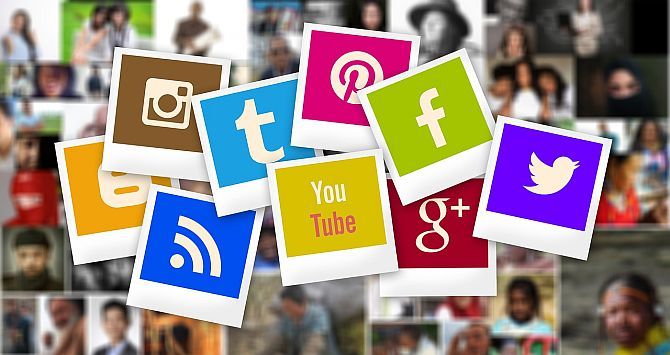Digital campaigns compared to billboards or even print ads not only have the power to reach wider audiences but also reduce the campaign costs. The focus on social media by political parties at election time, therefore, is hardly misplaced.
Neha Alawadhi and Karan Choudhury report.

Social media, videos, apps, messaging services and networking platforms for professionals -- nothing is beyond the reach of campaigners this election season.
What started as novel ideas in 2014 have matured into full blown-digital campaigns by nearly all political parties this general election.
Digital campaigns compared to billboards or even print ads not only have the power to reach wider audiences but also reduce the campaign costs.
The focus on social media, therefore, is hardly misplaced.
But has it made a difference in reducing overall costs? Or translated into swaying the undecided voter in a particular party's favour? Many are on the fence about its impact.
Far from witnessing a decline in overall campaign costs, 2019 elections look set to surpass the 2014 expenditure, indicating that the traditional ways of campaigning -- public meetings, rallies and media advertisements -- still form the bedrock of political strategy.
But to say that digital is any less important would be an understatement.
Given the improvement in internet infrastructure and the rise of regional language apps that cater to rural India, coupled with the platforms for the urban populace such as Facebook, Twitter, WhatsApp, Google and Instagram, reaching out and trying to convert the "undecided voter" is now easier than ever.
'Social media users are no longer just urban professionals and students.
Hyper-segmentation of voters using social media analytics has made identity politics a viable social media campaign strategy,' wrote Sangeeta Mahapatra, visiting fellow at the Institute of Asian Studies, German Institute of Global and Area Studies, Hamburg, in a blogpost on the London School of Economics' website in January.
This has been helped by the explosion of information for language speakers in the country.
The social networking platforms available in 14 Indian languages -- ShareChat, Chinese Bytedance-backed social and news sharing app Helo , short video sharing platform TikTok, and content and local language news app Dailyhunt -- have together managed to create a significant user base.
The chosen strategy of parties has been to use a mix of online and offline voter data, regional language messaging platforms and regional language messaging and campaigning.
One just has to look at the political advertising spends made public by Facebook and Google to gauge the importance parties are placing on digital.
For instance, in the most recent reports made available for the week of April 21-27, the highest political spend on Facebook came from the Bharatiya Janata Party, Congress and Odisha's Biju Janata Dal.
Similarly for Google, the overall political ad spend since February 19 has been the highest from the BJP, followed by Dravida Munnetra Kazhagam and Yuvajana Sramika Rythu Congress Party.
The combined ad spend of parties together on the two platforms is over Rs 40 crore.
As election spends go, this amount is just a fraction of the overall campaign budgets.
But this is partly because of the cautious approach social media platforms have adopted this time round.
"Facebook has become very tough to advertise on, and they've become very cautious because of the intense scrutiny of their practices after Cambridge Analytica. This has made it imperative to look at other platforms," said a digital marketing agency head.
Parties, however, are tapping other platforms, such as Linkedin and cricket and Bollywood focused apps that invite traffic during big events.
The question and answer forum Quora is also becoming important.
In response to a question:"What are some dark secrets of BJP/AAP/Congress IT cells?" several "top writers" explained how they were solicited by political parties as recently as early April to write favourably for them.
Top writers on Quora are contributors who reply consistently on the forum and usually have a large following.
But is the effort worth it? While it looks like a case of hitting in all directions, many do not believe online platforms make the granular level impact they are often thought to make.
"The Indian voter is fickle. This election has several local, regional and caste factors. All these things are not easy to project in social media campaigns. Social media campaign is easier for making a large narrative but not for multiple local elections," said the social media campaign manager quoted earlier.
The widespread problem of fake news has complicated matters further for digital.
Just before elections began, the Parliamentary Standing Committee on Information Technology asked the top bosses of Facebook, WhatsApp, Instagram and Twitter to appear before it and explain how they proposed to "safeguard citizens' rights on social/online news media platforms".
The hearings didn't achieve much, but managed to effectively put the social media firms in the spotlight right before elections.
The government also made an attempt to track the flow of misinformation and fake news, the other big themes this election.
The ministry of electronics and IT proposed amendments to existing rules for information and messaging platforms.
It has, for instance, proposed that intermediaries (like WhatsApp or Facebook) provide access to the origin of a message within 72 hours of a government agency making a request for information.
As traceability of fake news being spread through the Facebook-owned platform remains a challenge for the government, parties have become wary of using the platform.
Until last year, it was the preferred mode for voice calls because of its end-to-end encryption, but this year politicians have switched to alternative apps like Signal or Telegram to discuss sensitive political matters.
That means social media platforms too have to try harder for a share of the advertising pie this year.
It was in the beginning of 2017 that technology and social media giants started making routine trips to India.
The sheer scale of Indian elections was enough for them to gauge the business opportunity and make a beeline to different political party offices to woo them to launch their campaigns with them.
Google, Facebook and Twitter, were the first to reach Indian shores with laptops full of presentations on how to run social media political campaigns.
Facebook, which was trying to make amends for the Cambridge Analytica scandal, was keen to assure the government that it had taken various steps to ensure a free and fair election.
For instance, it has spelled out how it deals with and manages political advertisements and the steps it has taken to make it difficult for any party to influence voters through Facebook ads.
Facebook also promised to keep track of the money spent by political parties on advertisements they post on the website and have its content vetted to ensure that false information is not being disseminated to influence voters.
Aiming to be the biggest social media campaign manager for all political parties, Twitter Chief Executive Officer Jack Dorsey made his maiden visit to India last year.
The 41-year-old, nose ring-sporting Dorsey reached out to all political parties and met government officials -- at the Centre and in states -- as well as senior police officer and civic body officials, so that he could assist in delivering governance through Twitter.
This has been the primary focus area for the social-media giant as it chalks out its next stage of expansion.
Dorsey offered all the tools Twitter used in the 2016 US presidential elections to social media teams of political parties in India.
It hired many social media experts to assist political parties in their online outreach.
Also it conducted workshops for student wings of these parties.
Its BlueRoom initiative featured interviews with leaders of political parties and student unions, as well as political commentators.
From promoting usage of local languages, hiring regional bloggers, social media influencers, regional think-tanks to organising road shows to educating people about the platform, Twitter has in the last one year done a lot to gain a chunk of new users.
The new entrant TikTok, which has gained popularity as well as notoriety in equal measure, has been so keen on working with the government that it has parked its global public policy director Helena Lersch for the whole period of general elections in India.
As part of her government outreach, Lersch stays in constant touch with Election Commission to ensure that her social media app is on the right side of the government and its machinery's intent.
The frenzy around digital is evident, but whether social media platforms can actually lift the fortunes of a party is unclear.










